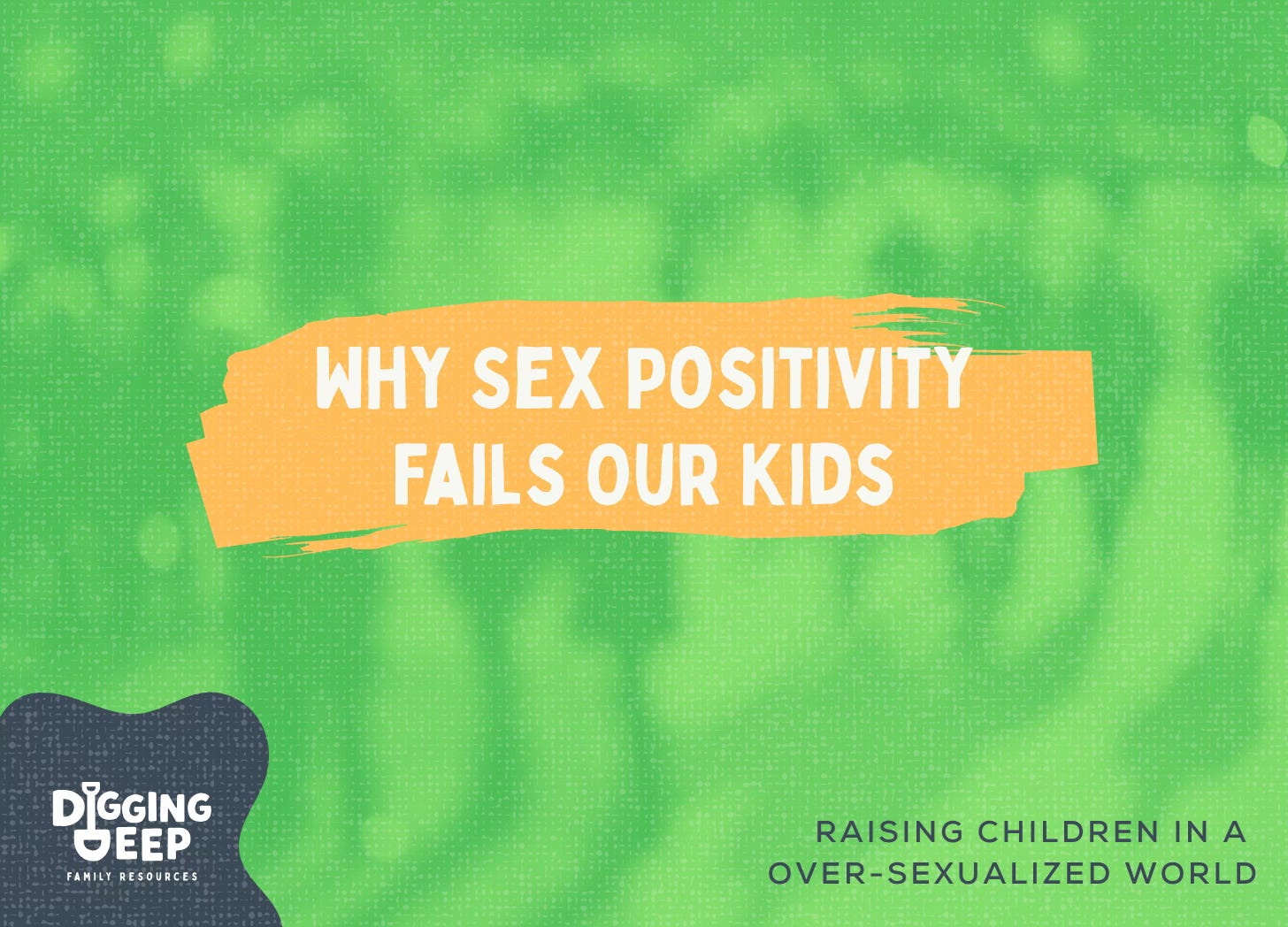Why Sex Positivity Fails Our Kids
“Sex works a lot like fire. When removed from its protective boundaries, it burns us and leaves scars. When brought and kept inside those covenanted boundaries, a sweet foretaste of the ultimate love feast between Christ and his Bride, the Church, is given”[^22].
Last week we looked at Charles Taylor’s idea of the social imaginary and how the Sexual Revolution has shaped the way our culture views the body and personhood. Today we are narrowing in on one key outworking of that cultural shift: sex positivity.
Next week we will turn our attention to the pornography epidemic. But for now, I want us to focus on the philosophy of sex positivity itself, because while it is often presented as inclusive and freeing, it is actually a counterfeit to the good and life-giving vision of sexuality God has given us in Scripture.
What Is Sex Positivity?
Sex positivity is a cultural movement that claims all consensual sexual activity is good and healthy, no matter its form. Even if you have never used the term, its ideas have soaked into music, entertainment, education, and social media. It celebrates sexual experimentation without moral boundaries, and it frames any form of moral judgment as harmful.
Wikipedia describes it as “an attitude towards human sexuality that regards all consensual sexual activities as fundamentally healthy and pleasurable, encouraging sexual pleasure and experimentation”[^23].
Mainstream outlets like Oprah Daily present it as a framework that begins by “tossing out” traditional definitions of what is sexually normal, replacing them with each individual’s personal interpretation of what feels genuine[^24].
On the surface, this sounds open-minded and accepting. But when we look closer, sex positivity is essentially relativism applied to sexuality. It claims there are no objective standards, yet it still has one: you cannot judge someone else’s sexual behavior[^25][^26].
The Lies of Sex Positivity
Sexual pleasure is a human right.
Many advocacy groups frame sexual pleasure as essential to personal freedom, even tying it to human rights. But in a biblical view, sex is not a right we are owed; it is a gift from God, designed for the covenant of marriage.
Identity is tied to sexual desires.
Sex positivity often equates sexual desires with a person’s core identity. That means any challenge to those desires is seen as an attack on the person themselves.
All sexual expressions are healthy.
This belief encourages the pursuit of any sexual impulse, no matter how damaging or degrading.
Consent is the only boundary.
In her Washington Post article “Consent is not enough. We need a new sexual ethic,” Christine Emba observes that the consent-only approach has left young adults “both liberated and miserable”[^27].
Self-control is suppression.
The movement portrays moral restraint as repressive, when in reality, self-control is a fruit of the Spirit that safeguards joy and intimacy.
Why This Matters for Our Kids
Rachel Gilson writes in Parenting Without Panic that one of our main responsibilities as parents is to “discipline our children’s imaginations according to what is real.” That means showing them that their bodies, desires, and sexuality are part of God’s good design, not raw material for self-expression.
Alan Noble reminds us in You Are Not Your Own that when we define ourselves entirely on our own terms, the burden is crushing. Nowhere is this more true than in the area of sexuality. When kids are told they must invent their own sexual identity and boundaries, they are set up for confusion, anxiety, and deep hurt.
We want to give our children a positive view of sex, but not the counterfeit of sex positivity. The biblical vision is that sex is good, but it is also holy. It was created by God to be enjoyed within the covenant of marriage, not parceled out as a tool for self-fulfillment.
Truths to Pass On
God created sex and called it good. The biblical vision of sex is not negative, it is life-giving.
Not all judgments are bad. Right judgment according to God’s Word protects life and flourishing.
Pleasure is a gift, not a god. When sexual pleasure is worshiped, it becomes destructive.
The gospel, not moralism, is the answer. Purity is not about earning God’s favor, but about living in the freedom Christ purchased for us.
The Counterfeit vs. the Real Thing
Sex positivity promises freedom, but it delivers confusion and pain. The gospel offers something far better: a vision of sex rooted in covenant love, mutual self-giving, and joy that reflects the love between Christ and His Church.
As Gilson says, “We do not need to panic. We need to be faithful.” In a hyper-sexualized world, that means helping our children see through the counterfeits so they can embrace the beauty of God’s design.
Next week, we will take this conversation further by looking at the pornography epidemic and how it preys on the very lies sex positivity promotes.
[^22]: Rachel Joy Welcher, Talking Back to Purity Culture: Rediscovering Faithful Christian Sexuality.
[^23]: Allena Gabosch, “A Sex Positive Renaissance,” 2014-12-08.
[^24]: https://www.oprahdaily.com/life/relationships-love/a30028506/sex-positive-meaning/
[^25]: Hillary Morgan Ferrer & Amy Davison, Mama Bear Apologetics: Guide to Sexuality, p. 137.
[^26]: Borrowed from Joe Carter’s article, https://www.thegospelcoalition.org/article/incel-movement-repugnant-logic-sexual-revolution/
[^27]: Christine Emba, “Consent is not enough. We need a new sexual ethic,” Washington Post, March 17, 2022.



